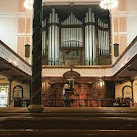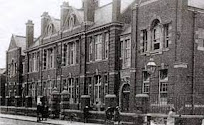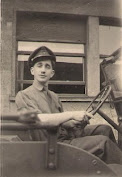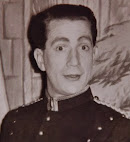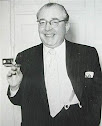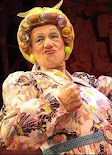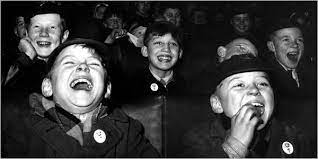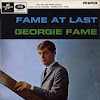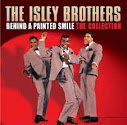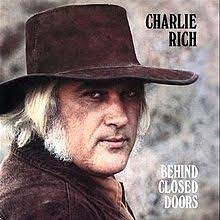Page views : 426

Although Wyn, who has died at the age of 96, worked in radio and television, it was for his work in the theatres across the length and breadth of Britain that he will be best remembered in a career which lasted sixty-five years and in which he entertained hundreds of thousands of men women. It was, however, the children who laughed and giggled at his pantomime performances as Widow Twankey, that gave him the greatest satisfaction and, as he said :
“laughter is the best music of all and the sound of a theatre full of kids laughing is special". Although sometimes acclaimed as 'The Laurence Olivier of Pantomime Dames', he was always : 'The Welsh Prince of Laughter'.
Youth
He was born in the August of 1925 in the Temperance Hotel in the town of Narberth in Pembrokeshire, North Wales, which his mother ran as a B & B in Main Street, opposite the Old Town Hall. He was delivered by the district nurse who identified herself to him over forty years later, as a member the audience when he played at Tenby's De Valance Pavilion. The son of Ethel and John Calvin -Thomas, he was the seventh of eight children and became known as 'Wyn' after his second forename, 'Wyndham'.
In his 1920s childhood memories of Narberth he said :
"Thursday, I recall, was market day in the town where I remember the sheep, goats and cattle being tied-up against the houses in the street waiting for a sale. Now there’s a blue plaque on the wall that records my birth in a pub with no beer. The trip to the railway station was my first experience of riding in a taxi – it was well-known as 'Ben the Bus' - a four-wheeled trap with a black covering which took Mother Ethel with baby Leo and my two sisters Molly and Betty and myself - the boys had to walk. When asked on the train how old I was I was told to say "three" - that meant no fare; free travel for me". 
In 1930, when he was five years old, his father must have secured new and profitable employment in Cardiff, because that's were he moved his family of ten into a three-storied Victorian town house in Cathedral Road where between 1885 and 1900 many large villas were constructed, occupied by the very wealthiest families of Cardiff. Number 121 would remain Wyn's home for the rest of his life, all 91 years of it. Wyn, however, commented that he always said :
"Pembrokeshire remains 'Pembrokeshire', remains 'Home of the Heart' and later in life regularly regularly returned to take part in 'Narberth Civic Week', where he was held in high regard.
He now attended Kitchener Road Infants and then Radnor Road Junior School. He described his family as
"well-steeped in Prebyterianisn - non-conformity" and one sunday he recalled that he made his first :
"Stage appearance at Tabernacle Church, the constant twice-on-Sunday venue. I remember speaking to my sister during a service and being told, "You do not talk in chapel". Not to be silenced, I pointed to the pulpit and ad-libbed, "He's talking all the time" ". It was in the same chapel that he found his performing feet at concerts and recitals.
He was taken to his first pantomime by his father in Cardiff at the age of seven and remembered :
"Sitting in the circle and looking down on this world of music, amusement, movement, colour and thinking : 'That's the world I want to be part of. Not this rotten world in this awful school I'm going to. It was my road to Damascus". He felt the same way about his secondary school,
Canton High School for Boys when he was 16, during the Second World War when he said :
"On 2nd January 1941, one hundred and eleven German planes came over to destroy the City and the following morning I went down to see the smoking ruins of the school I was going to in Canton and I remember thinking : 'That Hitler can't be all bad. It was exactly what I wanted to do to the place". (link)
In reality the damage wasn't that bad and the school was only closed for one day and another pupil called Imprey told the BBC in 2016 : "The upper storey - that was the boys' school - was completely burnt out and to get to the classrooms that escaped damage, you had to pass through an open space with no roof. This was frequently flooded and you needed to use stepping stones to get to an area we called 'the ruins'. There was no electric or heating and we had lessons in overcoats and took candles in for the last lessons when it was getting dark. It was incredible and wouldn't be allowed now".
As a boy he found that :
"Cardiff, compared with Pembrokeshire, was a frightening place. But every school holiday Leo and I were returned to Begelly (in Pembrokeshire) where Uncle Harry was schoolmaster and we loved returning to the school-house. A special memory is of Luther the postman who knew the family. One day he told us : “I've a postcard for you. It's from you mum and dad. They are coming to collect you on Thursday”. Such was the privacy of postcards in the hands of postmen. I didn’t have to read it myself".
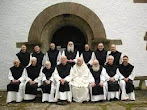
 "Holidays meant swimming trips to Saundersfoot or the North and South beaches at Tenby. Then a lemonade at the exciting cafe on the cliff-side with wonderful views of the harbour and the monk's boat either arriving or leaving for Caldey Island. Many years later I visited the island (and its monastery) to record a BBC radio interview with the Father Abbot. On my arrival at the monastery he greeted me with : "It's good to meet you with your own clothes on". Surprisingly, he added : "I saw you a few months ago at Birmingham when you were playing Mother to Ken Dodd in the pantomime".
"Holidays meant swimming trips to Saundersfoot or the North and South beaches at Tenby. Then a lemonade at the exciting cafe on the cliff-side with wonderful views of the harbour and the monk's boat either arriving or leaving for Caldey Island. Many years later I visited the island (and its monastery) to record a BBC radio interview with the Father Abbot. On my arrival at the monastery he greeted me with : "It's good to meet you with your own clothes on". Surprisingly, he added : "I saw you a few months ago at Birmingham when you were playing Mother to Ken Dodd in the pantomime".
War
Wyn left school at 17 and at 18, in 1943, he was conscripted into the Royal Army Service Corps for wartime service which involved him acting as :
"A lorry driver, haring down to the South Coast" of England . He did, however collapse during training and was diagnosed with a heart condition and recalled :
"My medical report invaliding me out of the Army sounded a serious, final warning. I had a heart problem, it seems, and the medical reports said, 'Probable length of life – six months'". With characteristic resilience he bounced back and later said :
"Anyway, I thought : 'If I can't join them, then I want to entertain them. Make them laugh, cheer them up at a difficult time in Britain’s history'. There was not much else to laugh about". Wyn said : "So I passed an audition at Theatre Royal, Drury Lane, believing you should always start at the top and joined ENSA - 'Every Night Something Atrocious,' the massive organisation to entertain the fighting forces. With war still raging, our rehearsing revue was told we were to leave for France, Belgium and newly-liberated Holland, so we had to be in uniform – or be shot as spies by one side or the other. The day I was put into that ENSA uniform Hitler committed suicide. "He must have heard that I had joined up again. Serve him right", I said with a laugh". In the ENSA Review he played in a cast which consisted of a comic, to whom he, as the juvenile, fed lines and the rest were women in uniform who performed the song and dance.
They played in Airforce and Army bases in the South of England.
"Then we were told we were to go to France. Belgium, newly-liberated Holland and the War was still raging and we'd have to be in uniform in case we were taken prisoner, in which case we would be treated as 'Military'. But if we were in 'mufti' - civilian clothing - we would be treated as spies and shot". "The day I was put into that ENSA pseudo-military uniform Hitler committed suicide - so he knew I was coming over there". When they reached the newly defeated Germany, they appeared at the re-opened Düsseldorf Opera House.
(link)
Repertory theatre
Demobbed from the Army at the age of 20 at the end of the War he went straight into entertainment, breaking the family tradition of producing Presbyterian preachers.
(link) Wyn said :
"My father was a preacher, my eldest brother and uncle were Prebyterian ministers". He served his apprenticeship in theatre spending five years in repertory theatre, touring Britain :
"Manchester, Oldham, as far north as Motherwell and as far south as Torquay". It was a different play every week and he rehearsed next week's play during the day and played this week's during the day and estimated he played over 250 different roles.
He recalled in one season at St Annes-on-Sea : "We had a producer who on a Tuesday night would stand at the back of the stalls and if there was a bit of dialogue he didn't hear he used to yell : "Are you keeping it a secrets ?" And if there was a danger of that voice coming from the back of the stalls, you made sure that yours was heard at the back of the circle, but without shouting - natural projection of the voice - but not shouting. A very valuable, early lesson for an actor or performer of any sort". "I found the more dramatic and more romantic of the roles I played, the bigger the laughs I seemed to get. So it dawned on me that with a face and voice like mine, it had to be comedy". (link)
Pantomime

He first added pantomime to his repertoire at the Palace Theatre in Reading in 1947 and the following year was in Swansea playing the Baron in Cinderella, played by Joan Laurie with her mother, the radio star, Gladys Morgan playing the Ugly Sister and whose laughter, Wyn affectionately remembered : "
Would generate more in the audience". In the years that followed he played Buttons, Idle Jack, Simple Simon but, most successfully, Humpty Dumpty, the script of which had been written for Harry Secombe who played it in the West End of London.
(link)
Wyn reprised it for 6 seasons and on the last occasion, in Bristol he recalled :
"Tom Arnold who was the 'King of Pantomime Producers' said : "Next year I want to see you in skirts". Now being in skirts was playing a Dame. I said "No Tom. I couldn't play Dame. I don't feel feminine and he said : "That's why you'd make a good Dame, because good pantomime Dames should never be other than a fellow in costume. That's why its amusing to children. You' l be amusing by attempting to be feminine and failing. That's funny ".(link)In 2020 Wyn recalled :
"Pantomime was hard work, particularly playing Dame and I used to do ten changes at each performance and performances were twice daily and I used to say : "I work much harder in the dressing room than I do on the green" (stage). I look back on it and I think : 'Twice daily, six days a week and running, as we used. to from December into March and April. You're in the theatre from noon and you're not till 11 o'clockish in the evening. It was a form of imprisonment - it was a joy". Getting ready took him 30 minutes and each of the ten costume changes took four minutes each, with each cotume getting more ludicrous, not unsurprrisingly he said that from the late 1950s : "Thank God for Velcro".He recalled when he was playing Widow Twankey in Coventry and one Sunday, when the stage was free, Donald Wolfit, the great Shakespearean theatre-manager, was to give a charity performance and Wyn gave him the use of his dressing room. When he entered the room he found the great man was :
"Fingering and looking at my costumes and he said : "Wyn, I am very jealous of you". I said : "Jealous of me Sir Donald ?" He said : "Yes, you are playing the one classical roles that I wanted to play and never did". I said : "Widow Twankey Sir Donald ?" "Yes. British lady living in China, widowed and with two recalcitrant sons and trying to bring up these two lads as a widow and having to take in dirty washing". Wyn said of this assessment of the role of Widow Twankey :
"Hadn't even occurred to me and I was playing the silly woman". But that was Donald Wolfit- an indication of how widespread is the appeal of pantomime even with great classical performers who respected it as special means of entertainment and that hast lasted for 150 years at least, in this country only. Pantomime appears nowhere else. No other country puts on a pantomime".Over the years Wyn shared the stage with singers Cilla Black, Craig Douglas, Shirley Bassey, Frankie Vaughn; screen actors : Britt Ekland and the American 'Mr T' who thought
'there was no script because it was all mime'; boxer :
Frank Bruno (link) and comedians : Bob Hope, Bud Flanaghan, Morecambe and Wise, Harry Worth, Roy Hudd, Des O'Connor, Mike and Bernie Winters, Canon and Ball, Les Dawson and Ken Dodd. When in his prime, at the age of 50 in 1975, he starred in a production at the Royal Court, Liverpool and one critic reported that he was as
“bubbling and effervescent as an overflowing magnum of champagne”.  He recalled speaking to Ken in 2018 : "A month before he died I was having a long chat with him on the phone. We talked about the 50 years wed known each other - the experiences and the changes over 50 years and I said : "Ken we have both been very lucky and he said : "No Wyn. I must contradict you. We have not been lucky. We have been blessed and that is much deeper than luck". And I thought : 'Bless his heart. The philosopher remains. He was highly intelligent and knowledgeable man. A very wide-read man, a very wide character and a delightful pal. His interest was always in you not in me. A great character. One of those it has been a great privilege to have known and been friendly with".(link)
He recalled speaking to Ken in 2018 : "A month before he died I was having a long chat with him on the phone. We talked about the 50 years wed known each other - the experiences and the changes over 50 years and I said : "Ken we have both been very lucky and he said : "No Wyn. I must contradict you. We have not been lucky. We have been blessed and that is much deeper than luck". And I thought : 'Bless his heart. The philosopher remains. He was highly intelligent and knowledgeable man. A very wide-read man, a very wide character and a delightful pal. His interest was always in you not in me. A great character. One of those it has been a great privilege to have known and been friendly with".(link)

When playing 'Babes in the Wood' with Les Dawson and Wyn recalled
: "He did his first panto in Leeds and used to stand in the wings watching me and one day he said to me : "Me, I could never do what you're doing playing Dame". I said : "Les, you could because you've got all of the attributes of one of the greatest-ever Dame performers, Norman Evans, with his 'Over the Garden Wall'. You've got the same accent, appearance and ability that he has. You would make a great Dame and he started thinking about that and trying find film of Norman Evans and of course from that came the wonderful double act he did with Roy Barraclough". (link)
Radio
Like many stage successes in the 1960s his ascendancy had been propelled by his popularity on the radio in the 1950's and later reflected that radio filled the theatres because listeners wanted to see the performers, whereas television emptied them because they could see entertainers at home.
(link) He paid a moving tribute to the last day of the Swansea Empire which had closed in 1957 :
(link)
He broke into radio as 'Tommy Trotter' in the radio show
'Welsh Rarebit', a pioneering comedy show, recorded at the BBC’s studios, then on Park Place in Cardiff which ran until 1956 and finished each show with a rousing 'We’ll Keep A Welcome'. It was here, in his late twenties, he worked alongside Gladys Morgan, Harry Secombe, Stan Stenett, Albert and Les Ward and resident choir 'The Lyrian Singers', which included two singers who would go on to delight opera houses globally – Sir Geraint Evans and Stuart Burrows.
He also featured in the BBC Light Programme
'Workers’ Playtime' on 47 separate occasions from 1951 to 1964 and said he was on so many times they called him the 'Workers' Plaything'
(link). He recalled that the programme was cretaed when War Ernest Bevin, War Time Minister of Labour, was intent on seeing that the wireless was useful to those working in factories doing War production and he said twice a week in the lunch hour there should be variety performers. After the War he featured in the Radio's 'Midday Music Hall' on 13 occasions from 1953 to 1964.
(link)
Variety theatre
When not in panto, in the summer during the 1950s and 1960s, he starred in variety summer shows at many leading British sea resorts and he attained top billing at Blackpool’s Central Pier Theatre for five consecutive summer seasons and was a particular favourite in Llandudno, where he appeared for seven seasons from 1955. Apparently, one land lady who saw him performing once said : "If I'd had known you were top of the bill, I'd have given you clean sheets".
He himself had said : "I was always fascinated by the variety theatre of the time. That world of twice nightly variety, using a vast array of variety acts- many would go into the panto at Christmas". He described it as that : "World that followed music hall" and said :"I was intrigued by anyone who had the ability to entertain an audience in some way : comically or musically or physically. It impressed me very much that people could keep a theatre full of punters interested and entertained".

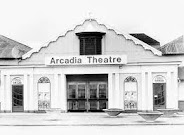 In 1967, while appearing at the Arcadia Theatre in Llandudno, Calvin surprised the audience by making an impromptu political speech from the stage. The MP, the Secretary of State for Wales, later the Speaker of the House of Commons, George Thomas, had been persuaded to visit the theatre, which was threatened with closure. After listening to Calvin’s plea for the theatre’s future, Thomas approved its purchase by the local council and the venue continued to stage live shows for a further 25 years.
In 1967, while appearing at the Arcadia Theatre in Llandudno, Calvin surprised the audience by making an impromptu political speech from the stage. The MP, the Secretary of State for Wales, later the Speaker of the House of Commons, George Thomas, had been persuaded to visit the theatre, which was threatened with closure. After listening to Calvin’s plea for the theatre’s future, Thomas approved its purchase by the local council and the venue continued to stage live shows for a further 25 years.
Fame

 In 2005 Wyn received a telephone call at home from Ian McKellen who was to play the Widow Twankey in an Old Vic production. Wyn recalled : "Mr Calvin ?" and I said "Yes". He said : "Ian McKellan here" and I said "Sir Ian?" and he said : "Well, more or less, 'Yes'. He said : "I've been invited to play pantomime, which I've never done before". I'm talking to a Hollywood Great and one of our finest actors, but he said : "I'm going to play Widow Twankey in the West End and I've been told that you are the Principle Widow Twankey in the country and would you be available and free to give me some guidance about playing the role ?" and I said : "Sir Ian, I'll do that with the greatest pleasure, if our diaries can coincide". (link)
In 2005 Wyn received a telephone call at home from Ian McKellen who was to play the Widow Twankey in an Old Vic production. Wyn recalled : "Mr Calvin ?" and I said "Yes". He said : "Ian McKellan here" and I said "Sir Ian?" and he said : "Well, more or less, 'Yes'. He said : "I've been invited to play pantomime, which I've never done before". I'm talking to a Hollywood Great and one of our finest actors, but he said : "I'm going to play Widow Twankey in the West End and I've been told that you are the Principle Widow Twankey in the country and would you be available and free to give me some guidance about playing the role ?" and I said : "Sir Ian, I'll do that with the greatest pleasure, if our diaries can coincide". (link)

 Wyn, who in 1991, at the age of 66, had became the first Welshman to be elected 'King Rat' of the Grand Order of Water Rats, a show business fraternity and charity, suggested that they meet in the 'Water Rats Lodge' in Grays Inn Road and Ian said : "That would be a great privilege" and I thought : 'This is one of our greatest actors and he has nowt opinion of variety, that world of entertainment from which the Water Rats have developed over 150 years and that is an interesting insight into his wide interest in entertainment and that he would have that impression that it would be a privilege to be chatted to in a Water Rats Lodge"
Wyn, who in 1991, at the age of 66, had became the first Welshman to be elected 'King Rat' of the Grand Order of Water Rats, a show business fraternity and charity, suggested that they meet in the 'Water Rats Lodge' in Grays Inn Road and Ian said : "That would be a great privilege" and I thought : 'This is one of our greatest actors and he has nowt opinion of variety, that world of entertainment from which the Water Rats have developed over 150 years and that is an interesting insight into his wide interest in entertainment and that he would have that impression that it would be a privilege to be chatted to in a Water Rats Lodge"
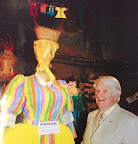 Ian wanted to play the part of Widow Twankey in the Old Vic panto 'Aladdin' and
Ian wanted to play the part of Widow Twankey in the Old Vic panto 'Aladdin' and the first piece of advice he gave him in playing Dame in the theatre in winter was :
"Keep your padded bra on the radiator over night. Putting on a bra in the midwinter in a dressing room. 'Brrrrr'". Wyn himself played in his last panto at the age of 86 in 2010. His Widow Twankey hat with a miniature washing line on top is now
an exhibit at Wilton’s Music Hall Museum in London.Wyn's work for charity had been recognised in 1991 when he was appointed MBE. Less well-known was the fact that he was a columnist in the 'Western Mail' for many years and was an accomplished after-dinner speaker and spoke at St. David's Day events all over the world and lectured on the subject : 'Laughter - The Antidote to Stress'. His appearances took him to Malaysia, Jakarta and Vietnam in the Far East and many American states in the West. In 2021 the British Music Hall Society hosted a celebration of his 75 years in showbusiness and to mark his 90th birthday in 2015, the British Music Hall Society held a lunch in London in his honour at which his pantomime pupil, Ian Mckellen, was present.
Wyn had said : "Looking at the business and remembering the names that suddenly appeared and equally suddenly disappeared, I’m reminded of the comment from Richard II when Shakespeare put words into the mouth of John O’Gaunt – "Sudden storms are short, small showers last long". And I am grateful to be a small, but long-lasting shower”.
and :
"Pantomime was always a joy because there nothing more joyous in life than hearing a theatre full of people laughing. That is a great joy and a lasting experience".
* * * * * * * * * * * * *
And making it all worthwhile : my tweet :
and your replies :
Andy Bell : Diolch - thank you. Wonderful history.
BlairSupporter : This if a fabulous and comprehensive tribute to Wyn Calvin.
Phylipharries : Waw ! What a great piece. Superb.
Mark Austin : This is an incredible tribute to the great Wyn Calvin MBE.
John Geraint : Great to have Wyn Calvin's illustrious career remembered in this way.
Ian Parsons : Brilliant tribute.
Gwyn Davies : Your article sums him up brilliantly.
Gareth D Morewood : Fantastic. Thanks so much for sharing.
 Although Wyn, who has died at the age of 96, worked in radio and television, it was for his work in the theatres across the length and breadth of Britain that he will be best remembered in a career which lasted sixty-five years and in which he entertained hundreds of thousands of men women. It was, however, the children who laughed and giggled at his pantomime performances as Widow Twankey, that gave him the greatest satisfaction and, as he said : “laughter is the best music of all and the sound of a theatre full of kids laughing is special". Although sometimes acclaimed as 'The Laurence Olivier of Pantomime Dames', he was always : 'The Welsh Prince of Laughter'.
Although Wyn, who has died at the age of 96, worked in radio and television, it was for his work in the theatres across the length and breadth of Britain that he will be best remembered in a career which lasted sixty-five years and in which he entertained hundreds of thousands of men women. It was, however, the children who laughed and giggled at his pantomime performances as Widow Twankey, that gave him the greatest satisfaction and, as he said : “laughter is the best music of all and the sound of a theatre full of kids laughing is special". Although sometimes acclaimed as 'The Laurence Olivier of Pantomime Dames', he was always : 'The Welsh Prince of Laughter'. 
 He first added pantomime to his repertoire at the Palace Theatre in Reading in 1947 and the following year was in Swansea playing the Baron in Cinderella, played by Joan Laurie with her mother, the radio star, Gladys Morgan playing the Ugly Sister and whose laughter, Wyn affectionately remembered : "Would generate more in the audience". In the years that followed he played Buttons, Idle Jack, Simple Simon but, most successfully, Humpty Dumpty, the script of which had been written for Harry Secombe who played it in the West End of London.(link)
He first added pantomime to his repertoire at the Palace Theatre in Reading in 1947 and the following year was in Swansea playing the Baron in Cinderella, played by Joan Laurie with her mother, the radio star, Gladys Morgan playing the Ugly Sister and whose laughter, Wyn affectionately remembered : "Would generate more in the audience". In the years that followed he played Buttons, Idle Jack, Simple Simon but, most successfully, Humpty Dumpty, the script of which had been written for Harry Secombe who played it in the West End of London.(link)



 Ian wanted to play the part of Widow Twankey in the Old Vic panto 'Aladdin' and the first piece of advice he gave him in playing Dame in the theatre in winter was : "Keep your padded bra on the radiator over night. Putting on a bra in the midwinter in a dressing room. 'Brrrrr'". Wyn himself played in his last panto at the age of 86 in 2010. His Widow Twankey hat with a miniature washing line on top is now an exhibit at Wilton’s Music Hall Museum in London.Wyn's work for charity had been recognised in 1991 when he was appointed MBE. Less well-known was the fact that he was a columnist in the 'Western Mail' for many years and was an accomplished after-dinner speaker and spoke at St. David's Day events all over the world and lectured on the subject : 'Laughter - The Antidote to Stress'. His appearances took him to Malaysia, Jakarta and Vietnam in the Far East and many American states in the West. In 2021 the British Music Hall Society hosted a celebration of his 75 years in showbusiness and to mark his 90th birthday in 2015, the British Music Hall Society held a lunch in London in his honour at which his pantomime pupil, Ian Mckellen, was present.
Ian wanted to play the part of Widow Twankey in the Old Vic panto 'Aladdin' and the first piece of advice he gave him in playing Dame in the theatre in winter was : "Keep your padded bra on the radiator over night. Putting on a bra in the midwinter in a dressing room. 'Brrrrr'". Wyn himself played in his last panto at the age of 86 in 2010. His Widow Twankey hat with a miniature washing line on top is now an exhibit at Wilton’s Music Hall Museum in London.Wyn's work for charity had been recognised in 1991 when he was appointed MBE. Less well-known was the fact that he was a columnist in the 'Western Mail' for many years and was an accomplished after-dinner speaker and spoke at St. David's Day events all over the world and lectured on the subject : 'Laughter - The Antidote to Stress'. His appearances took him to Malaysia, Jakarta and Vietnam in the Far East and many American states in the West. In 2021 the British Music Hall Society hosted a celebration of his 75 years in showbusiness and to mark his 90th birthday in 2015, the British Music Hall Society held a lunch in London in his honour at which his pantomime pupil, Ian Mckellen, was present.

